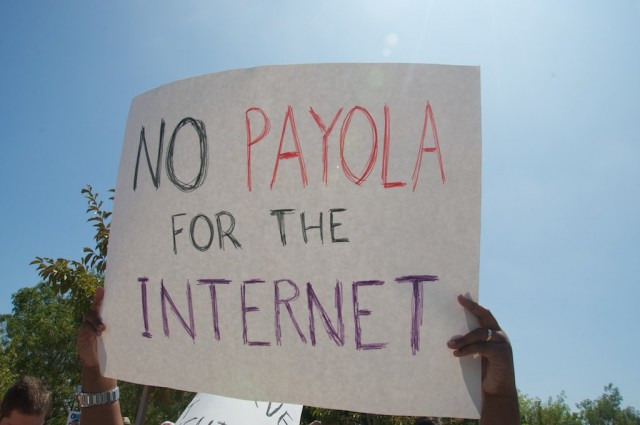
If the Federal Communications Commission still intended to enforce net neutrality rules, a court decision issued today would have qualified as great news at the commission.
The US Court of Appeals for the District of Columbia Circuit denied the broadband industry's petition for a rehearing of a case that upheld net neutrality rules last year. A three-judge panel ruled 2-1 in favor of the FCC in June 2016, but ISPs wanted an en banc review in front of all of the court's judges. The request for an en banc review was denied in the order issued today.
ISPs could still appeal to the Supreme Court, but the net neutrality rules are likely to be eliminated by the FCC's current leadership. FCC Chairman Ajit Pai, a Republican, opposed the rules when they were implemented by his predecessor, Democrat Tom Wheeler.
The court decision and its timing were influenced by Pai's proposal last week to dismantle the net neutrality rules and the classification of ISPs as common carriers under Title II of the Communications Act. The ISPs and broadband industry lobby groups that sued the FCC wrote to the DC Circuit court on Friday to alert judges of the new FCC proposal. Judges noted in today's order that "the en banc court could find itself examining, and pronouncing on, the validity of a rule that the agency had already slated for replacement."
TechFreedom, a libertarian think tank that opposes the net neutrality rules, said it intends to appeal to the Supreme Court.
Pai optimistic about eliminating rules
Pai said the court decision came as no surprise.
“In light of the fact that the Commission on May 18 will begin the process of repealing the FCC’s Title II regulations, it is not surprising, as Judges [Sri] Srinivasan and [David] Tatel pointed out, that the DC Circuit would decide not to grant the petitions for rehearing en banc," Pai said today. "Their opinion is important going forward, however, because it makes clear that the FCC has the authority to classify broadband Internet access service as an information service, as I have proposed to do. I also agree with many of the points made by Judges [Janice] Brown and [Brett] Kavanaugh in their compelling opinions explaining why the Commission’s Title II Order was unlawful.”
Consumer advocacy group Public Knowledge offered a different take. "The DC Circuit has once again confirmed that the FCC's Open Internet rules are lawful and supported by the evidence," Public Knowledge Senior Counsel John Bergmayer said. "Now, the primary threat to these important consumer protections is FCC Chairman Pai's determination to roll them back and to hand more power to monopolistic Internet access providers.”
Incompas, a trade group that represents pro-net neutrality companies, said that "the current law has shown itself to be both legally sustainable and market effective.”
Today's decision could provide pro-net neutrality groups grounds for an argument when they try to block the impending reversal of the net neutrality rules. While the FCC has authority to reclassify broadband providers, judges wrote that "the agency must carry out its authority in a reasonable and non-arbitrary way."
"Defenders of the current rules, now upheld, will undoubtedly challenge any reclassification as arbitrary and capricious, since they are motivated not by changed circumstances, but purely by partisanship and ideology," Michael Calabrese, director of the Wireless Future Program at New America's Open Technology Institute, told Ars.
reader comments
116